Why should we care about Washington’s tax structure?
1. Taxes allow our government to invest in the services and structures necessary for thriving communities and a strong economy. Broadly, investments in public services and programs are an investment in all of us.
Some of the most important areas that state revenues support are education – from early learning to K-12 public schools, Washington’s 34 community and technical colleges, and world-renowned research universities; community spaces where we can enjoy Washington’s natural beauty and spend time with loved ones; and health and human services, like support for vulnerable children and adults and public health departments.
2. The ways we tax and spend public money also affect income and racial inequality.
Income inequality in the U.S. has increased dramatically over the past 40 years. Wealth inequality is even greater, and when broken down by race shows a stark picture. In the US, the median or typical white family has nearly 8 times the net worth of a typical black family and around five times the wealth of a typical Latinx family. These differences in wealth are material consequences of a long history of oppression, discrimination, and inequality – but also of our current economic rules, including our current tax structure.
The typical white family isn’t all that well-to-do, either. The share of wealth held by the top 0.1% of Americans has increased from 7% to nearly 20% from the 1970s to today. Over the first year of the pandemic from March 2020 to April 2021, while unemployment benefits kept many families afloat, the collective wealth of American billionaires increased by 55%, to $4.5 trillion.
All that national wealth hoarded in the investment portfolios of billionaires leaves our public services starved for the resources our families and communities need to thrive together.
3. YOU can make a difference.
There are several upcoming opportunities to advocate for reform, including participating in “Tax Town Halls” this fall and supporting progressive revenue policies in the 2022 state legislative session.
How does Washington collect taxes now?
Washington State’s operating budget revenues come primarily from a combination of the sales tax, the Business and Occupation (B&O) tax, and the property tax. The B&O tax is unique to Washington. While most other states and the federal government tax business profits, Washington taxes the gross receipts or sales of businesses, without deductions for wages, supplies, and other costs. The sales tax contributes 50% of revenues for general state services, B&O 19% and property tax 16%. A collection of other taxes and fees, including on products like cannabis, cigarettes and liquor, contribute the remainder.
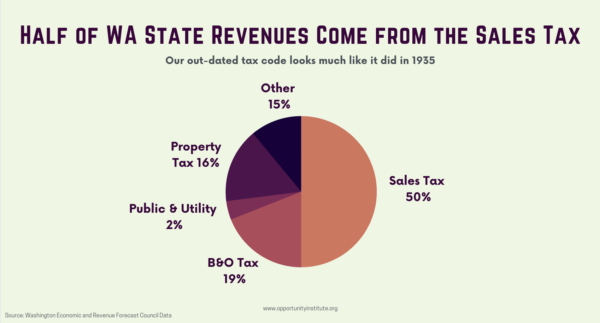
In thinking about this revenue pie, there are a couple facts to keep in mind. First, all of our major sources of revenue – the sales, B&O and property taxes – are considered regressive, or unfair. People and businesses with lower incomes pay much higher percentages of their incomes than do wealthy people and highly profitable businesses. Second, our tax code has remained essentially in its current form since 1935. A lot has changed since the Great Depression, but not the way Washington State collects its revenues.
One major impact of our state being so reliant on regressive revenue sources is that those with the least pay the most in proportion to their income. In fact, our tax code is considered the most unfair in the country. Washington is one of only eight states that does not have any form of income tax.
In 2021, the state legislature passed two important policies that will help make our tax code fairer: they fully funded the Working families tax credit and passed a tax on capital gains (a tax the sale of assets like stocks and bonds in which the profit exceeds $250,000). However, even when these improvements are fully implemented, our tax structure will remain tilted toward the wealthy, with lower- and middle-income residents paying too much and high-income people not paying enough toward healthy communities.
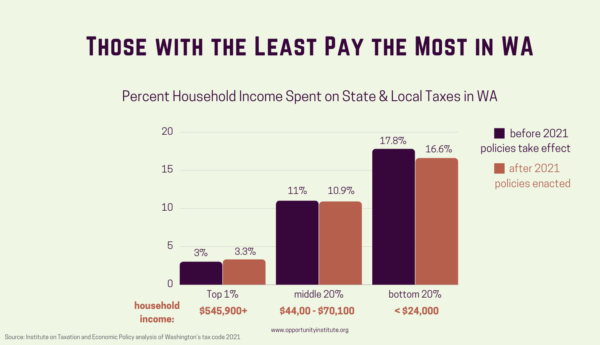
Our current tax structure also does not keep up with population and economic growth and the new demands for better educated workers and citizens, broadband access, climate change response, and more. Since the 1980s, state revenue and state spending have declined relative to our state’s wealth as measured in total personal income. For K-12 education this trend is particularly revealing. K-12 education funding represents about half of the state operating budget. Relative to total state personal income, K-12 investments went from 3.0% of total state personal income in 1990 to 2.5% today – a decrease of 17%. In 2012, the state Supreme Court ruled in the McCleary decision that our state legislature had not met its constitutional duty to amply provide for basic education of students due to chronic underfunding. Despite this ruling and subsequent efforts by the legislature to boost investments, spending on public schools has not returned to 1990s levels. Other important services like public health, mental health, child care, higher education, and housing also remain dramatically underfunded.
Overall, the structure of our outdated tax code fails to provide ample revenues for investments in communities and public needs, while perpetuating racial, gender, and economic inequality.
Clearly, our tax system is long overdue for holistic reform. Your participation can make a difference for our communities today and for future generations.
In considering reform there are three main goals – to create a system that is fair, provides ample revenue, and is sustainable, that is, responsive to our changing economy.
Tax Town Halls looking to system reform
The bipartisan Tax Structure Work Group was created by the legislature in 2017 to conduct research into the tax code and alternatives to it, facilitate public discussion, and make recommendations for reform. The Work Group is holding a series of Tax Town Halls to hear from the public each Wednesday from September 22 through November 3. Sign up for a Tax Town Hall here. To spur discussion, the Tax Structure Work Group published six “tax scenarios” that provide a landscape of reform options rather than a set of rigid policy options. The Work Group expects to bring recommendations to the legislature in 2023.
This is not the first time our state has convened a special group to study the tax system and recommend changes. The first met in the 1950s and the most recent in the early 2000s. All have made similar recommendations, including reducing reliance on sales taxes, adopting an income tax, and reforming business taxes, and yet our tax structure remains essentially as it was in 1935.
Intermediate steps to fund vital services now
Wholesale tax structure reform won’t happen overnight, but our children’s education and other critical services can’t wait. Our elected legislators could build on progress in 2021 with additional measures in 2022 to bring more fairness to our tax code and provide revenue for investments in our communities. Top contenders include:
- A wealth tax, such as HB 1406, introduced by Representative Noel Frame in 2021. Structured like a property tax, it would tax certain intangible financial assets, such as stocks and bonds, worth more than $1 billion. This tax would affect around 100 people or fewer in Washington and with a rate of 1% would raise about $2.5 billion a year.
- Estate tax reform to make an already progressive tax more progressive. Such a reform would exclude small estates, inject greater progressivity for large estates, and in doing so raise additional revenue to invest in underfunded needs such as housing security.
There is much work to be done to transform Washington’s tax system to one that is progressive, provides ample revenues for investments in the public good, and is sustainable over time. However, together we can create a stronger and more fair system to promote opportunity and build healthier communities.
Resources
EOI’s Quick Guide to Washington’s Tax Code workshop slide deck
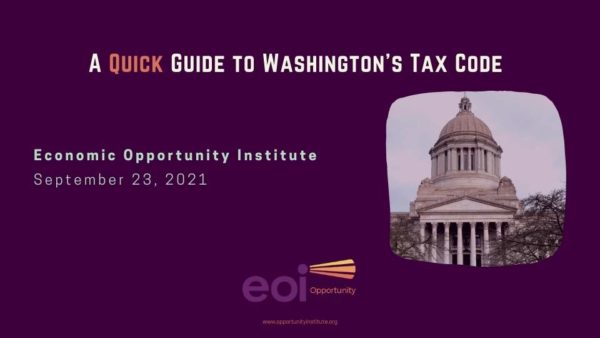
EOI’s Quick Guide to Washington’s Tax Code infographic
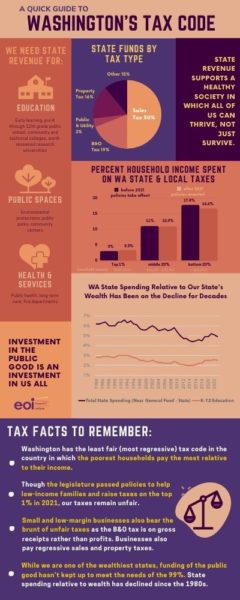
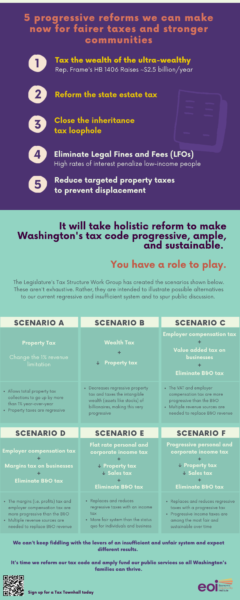
Citizen’s Guide to the Washington State Operating Budget
Survey of Consumer Finances, 2019 and the racial wealth gap
Letter regarding national wealth tax, and data concerning the concentration of wealth, Professors Saez and Zucman
Analysis of state spending relative to total state personal income, EOI
Wealth tax, HB 1406 bill page
Website for the Legislature’s Bipartisan Tax Structure Workgroup Preliminary report
More To Read
January 17, 2025
A look into the Department of Revenue’s Wealth Tax Study
A wealth tax can be reasonably and effectively implemented in Washington state
September 24, 2024
Oregon and Washington: Different Tax Codes and Very Different Ballot Fights about Taxes this November
Structural differences in Oregon and Washington’s tax codes create the backdrop for very different conversations about taxes and fairness this fall
July 19, 2024
What do Washingtonians really think about taxes?
Most people understand that the rich need to pay their share

Andrea Faste
It’s high time Washington state creates an income tax which addresses the gross inequality of our tax system now. I am impressed with the work that Noel Frame has begun, and am eager to see legislation that can pass legal challenges and be put in place soon.
Oct 2 2021 at 8:49 AM